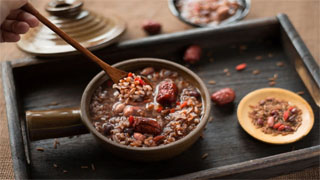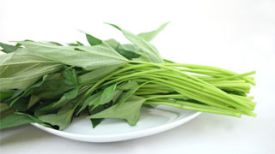
Now more and more people choose to use "grain rice" and "miscellaneous grain Congee" as the staple food of a meal, because the calories of the miscellaneous grain are lower than that of milled rice and white flour, and the cellulose content is very high, which is a typical "low calorie and high fiber" food. After all, people's diets nowadays are too high in calories, and any diet that can reduce calorie intake meets the health needs of people today.
In the "same origin of medicine and food" directory of traditional Chinese medicine, there are also many valuable "medicinal grains" and "medicinal grains". They not only have low calorie and high fiber content, but also can strengthen the spleen and dispel dampness, especially suitable for summer, because summer is very humid, and it is necessary to vigorously strengthen the spleen to avoid stagnation of dampness.So, what are these "medicinal grains" specifically?
For example, Poria cocos, yam, white hyacinth beans, lotus seeds, coix seed, and thicket seeds can be purchased in supermarkets and markets, and they are also part of the first prescription of traditional Chinese medicine for invigorating the spleen and promoting dampness, called "Shen Ling Bai Zhu San".
If their presence is often present in daily diet, it can not only help wet and fat people lose weight, but also help dry and thin people gain weight, because in the eyes of traditional Chinese medicine, although the results of obesity and thinness are different, the cause is spleen deficiency.
Shen Ling Bai Zhu Wan
The Classic Prescription of Traditional Chinese Medicine for Strengthening the Spleen and Removing Dampness
The spleen in traditional Chinese medicine is responsible for transportation and transformation, which includes both the absorption and distribution of diet and water, as well as the elimination of metabolic waste. Therefore, the spleen in traditional Chinese medicine is similar to the "logistics" in the body. Spleen deficiency means that "logistics" is not awesome.
When spleen deficiency occurs, people may become weak, fatigued, and pale due to poor nutrient absorption. They may also urinate after drinking due to poor water metabolism, or drink a little more water, feeling like they can hear the sound of water shaking in their stomach. More importantly, these dampness in the body can also make the body and face always plump and swollen, forming the unique "wet fat" of people with spleen deficiency
All these seemingly unrelated problems can be solved with "Shen Ling Bai Zhu San" in traditional Chinese medicine. This prescription comes from the "Tai Ping Hui Min He Ji Ju Fang" officially issued by the Song Dynasty. Due to its excellent compatibility and precise therapeutic effect, it has been highly valued by medical practitioners throughout history.
The "Jufang" has a high evaluation of it, stating that "this medicine neutralizes heat, nourishes qi and nourishes the mind after long-term use, awakens the spleen and pleases the complexion, and promotes righteousness and warding off evil." It has also been highly recognized and valued by medical practitioners throughout history for many years; Zhou Wencai, a medical expert in the Ming Dynasty, also commented that "this is the best way to treat weakness of the spleen and stomach, lack of food, vomiting and diarrhea, and base note after a serious disease to help the spleen and stomach".
Throughout the entire formula, ginseng, Atractylodes macrocephala, Poria cocos, licorice, yam, and lotus seeds are used to invigorate the spleen. Coix seed and white hyacinth bean are used to dispel dampness, while sand seed, platycodon grandiflorus, and stomach are used.
By strengthening the spleen, dispelling dampness, and harmonizing the stomach through three steps, we can strengthen the spleen and stomach, replenish and clear the qi, increase and decrease the turbid qi, and eliminate excess water dampness, fundamentally solving the problem of dampness.
Since it is said that it has been highly valued by medical practitioners throughout history, it is inevitable that modern medicine has applied it. For example, doctors may instruct patients undergoing intravenous infusion to take "Shen Ling Bai Zhu Wan" because intravenous infusion is equivalent to a large amount of water entering the body at once, and the spleen responsible for transporting and transforming water is burdened too heavily, making it easy to become tired and weak.
The loss of appetite and fatigue that many people experience after intravenous infusion is one of the manifestations of spleen deficiency caused by infusion, and the "Shen Ling Bai Zhu Wan", which can invigorate the spleen and promote diuresis, can just help alleviate the spleen deficiency caused by fatigue.
Daily spleen strengthening and dampness dispelling
First choice for these "medicinal grains"
Currently, there are too many people with spleen deficiency, but they often feel fatigued and powerless. Not only do they have weak digestive ability, but their feces are also irregular all year round or have multiple bowel movements a day. Eating cold or icy foods can make it difficult to digest and even cause diarrhea At this time, don't rush to take your medicine, because the dietary therapy version of "Shen Ling Bai Zhu Wan" is more suitable for you.
Firstly, most people with spleen deficiency in their daily lives are caused by their lifestyle, and they naturally cannot achieve the goal of becoming fat by eating at once. At this time, the weak temper is like a person recovering from a serious illness. The "Congee rice" made from "grains" like porridge rice is often more suitable than nutritious and targeted supplements;
Secondly, the dietary version of "Shen Ling Bai Zhu Wan" is suitable for all ages, whether in terms of its cold taste or suitability for various populations. The composition of the ingredients not only respects the meaning of "Shen Ling Bai Zhu Wan", but also comes from the "same source of medicine and food" catalog.
So, what specific ingredients are used in the dietary therapy version of "Shen Ling Bai Zhu Wan"?
The specific ingredients used include Codonopsis pilosula, Chinese yam, and Astragalus membranaceus, as well as Poria cocos, Coix seed, and Euryale seed, which are used to strengthen the temperament known as the "acquired foundation", while the latter helps to timely eliminate excess water and dampness.
Here we need to specifically talk about the combination of Codonopsis pilosula and Astragalus membranaceus!
Codonopsis pilosula
Codonopsis pilosula belongs to the ginseng category, and its nature and taste are sweet and flat. It is not as prone to getting overheated as ginseng.
Regarding it, the "Materia Medica Justice" records as follows: "The power of Codonopsis pilosula can nourish the spleen and stomach, moisten the lungs and generate fluids, promote the circulation of qi, and is not far from ginseng. Its particularly valuable value lies in its ability to nourish the spleen without dryness, nourish stomach yin without dampness, moisten the lungs without causing coldness, nourish blood without being overly greasy, drum and dance to clear yang, and vibrate qi without the drawbacks of rigidity and dryness.".
Astragalus membranaceus
Huangqi is known as the "first medicine for tonifying qi" and enters the spleen meridian. The Shennong Classic of Materia Medica lists it as a top-grade herb, and Li Shizhen said, "The elder is long and the yellow is yellow in color, which is the length of the tonic, hence its name.".
Throughout the ages, traditional Chinese medicine has often used a combination of Codonopsis pilosula and Astragalus membranaceus for strengthening the spleen and tonifying the lungs, as they both enter the spleen and lung meridians. Astragalus membranaceus is known for its ability to promote diuresis and promote diuresis, while Codonopsis pilosula is known for its ability to nourish blood and produce fluids, and for its ability to nourish both qi and blood.
The combination of the two can greatly enhance the power of invigorating the spleen and lungs. After the spleen and lungs are in good health, the metabolism of water and fluid is smooth, which reduces the burden on the "engine" that drives blood circulation in the heart. The subsequent recovery of physical strength and the disappearance of fatigue are all specific manifestations of the reduced burden on the heart when pumping blood.


